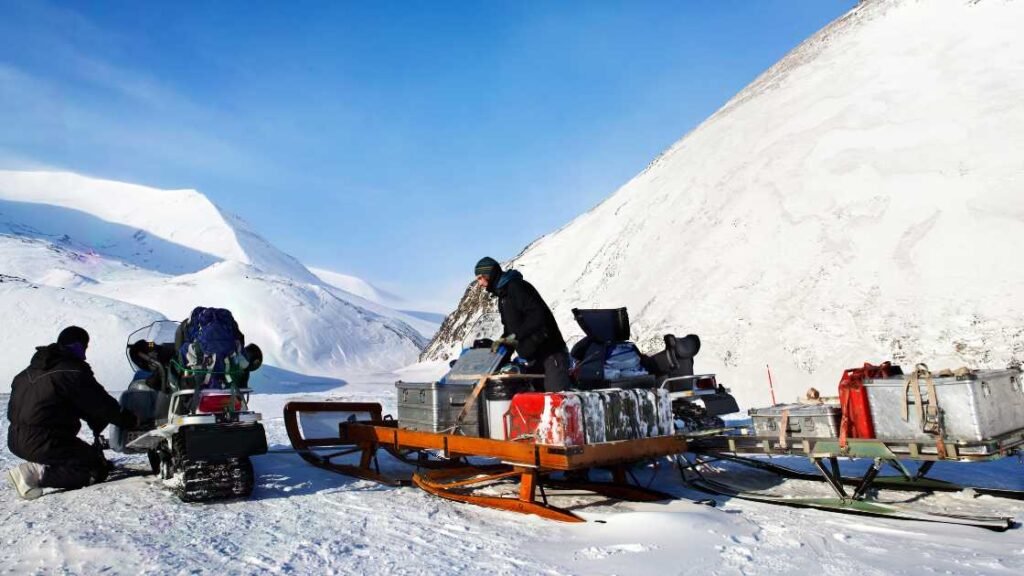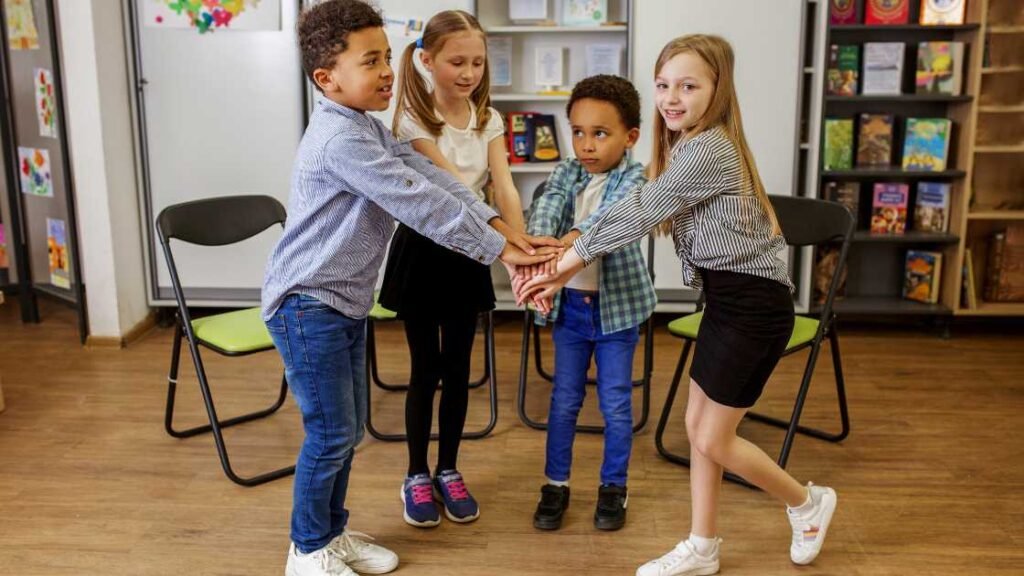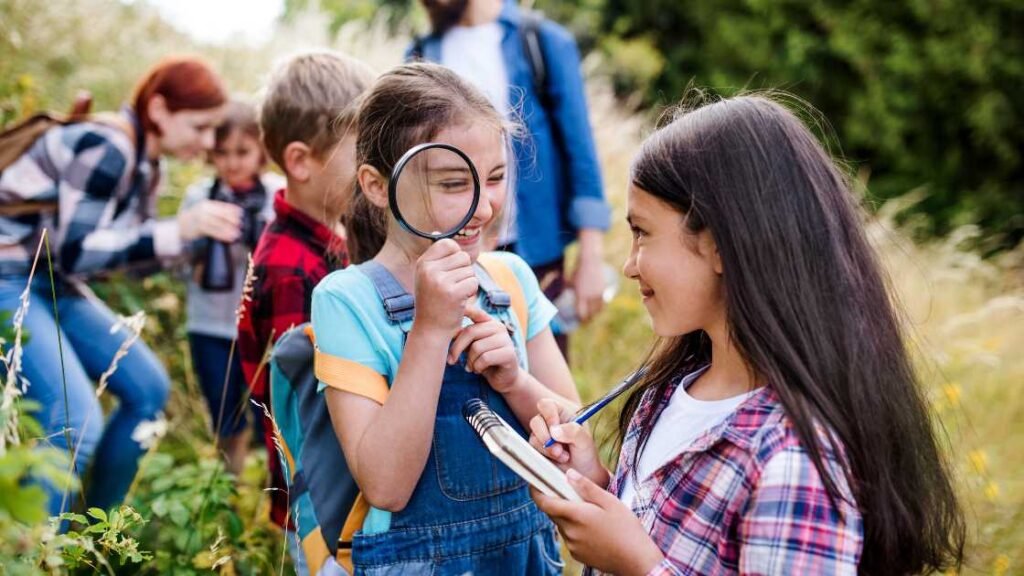School trips offer structured educational experiences and peer socialization benefits, unlike family trips. They foster independence and expose students to diverse learning environments and cultures.
Starting on a school trip often marks a significant milestone in a student’s educational journey. These excursions are more than just an escape from the classroom; they provide a unique educational experience that can significantly improve a student’s understanding and appreciation of the curriculum.
Exploring the Benefits of School Trips Compared to Family Trips, students, under the careful guidance of educators and experts, actively engage with historical sites, scientific exhibits, and cultural performances. This hands-on approach not only enriches their knowledge in ways that books and lectures alone cannot achieve but also fosters personal growth.

Navigating new settings with peers during school trips cultivates essential teamwork and communication skills, contributing to holistic development. These excursions emphasize the importance of responsibility and time management outside the familiar familial safety net, effectively preparing students for future challenges.
Crafted to spark curiosity, kindle new interests, and broaden horizons, school trips offer a well-rounded educational experience that perfectly complements traditional classroom learning.
Table of Contents
Toggle- Importance Of Educational Excursions
- School Trips: A New Horizon For Students
- Family Trips Through A Child’s Eyes
- Academic Growth On School Expeditions
- Development Of Life Skills On School Journeys
- Family Vacation Advantage: Personalized Learning
- Impact On Mental Health: School Vs Family Trips
- Balancing Leisure And Education In Travel
- Concluding Thoughts: Maximizing The Benefits
- Frequently Asked Questions Of What Are The Benefits Of School Trips Compared To Family Trips
- Conclusion
Importance Of Educational Excursions
Trips away from the classroom ignite a love for learning that textbooks can’t match. School trips shine in their ability to blend education with adventure, creating experiences that stay with students for a lifetime.
Enhancing Classroom Learning
Education bursts beyond the four walls of a classroom when students set off on educational excursions. Actions and observations replace reading and listening, transforming theories into tangible truths. Witnessing real-life applications of their lessons, students connect the dots more swiftly and remember facts more vividly.
- Hands-on experiences solidify textbook theories.
- Visits to historical sites, museums, and nature reserves bring subjects to life.
- Real-world insights make learning meaningful.
Promoting Social Development
Away from home, students nurture soft skills among peers. They learn to cooperate, communicate, and care for one another. Boundaries break down and friendships flourish. For many, these trips mark their first adventures without family, fostering independence and confidence.
| Social Skill | Developed Through |
|---|---|
| Teamwork | Group activities and challenges |
| Communication | Sharing thoughts and ideas |
| Empathy | Caring for peers’ well-being |
School Trips: A New Horizon For Students

School trips unlock a world of learning unlike any other. They transcend classroom walls. Students gain real-world experiences that shape their perspectives. The new horizons that school trips provide are vibrant and filled with opportunities.
Exposure To Diverse Cultures
Embracing new cultures is a cornerstone of school trips. Students interact with different communities, which raises awareness and understanding. This experience is essential for nurturing global citizens.
- Language Skills: Practical use improves communication.
- Traditions: Celebrations and customs come to life.
- Food: Tasting local cuisine broadens palates.
Learning Through Adventure
Adventure-based learning is exhilarating. It challenges students physically and mentally. Field trips often involve activities like hiking, museum visits, or science projects. These outings foster problem-solving skills and teamwork.
- Resilience: Overcoming obstacles builds confidence.
- Curiosity: Hands-on experiences spark interest.
- Memories: Shared adventures create lasting bonds.
Family Trips Through A Child’s Eyes

Imagine seeing the world with fresh eyes and endless wonder. This is exactly how children experience family trips, distinct from school outings. They offer young minds a canvas to paint lasting memories with those they love.
Bonding And Memorable Experiences
Family trips are special. There are times when everyone laughs, Investigates, and learns together. Shared adventures create strong family bonds and stories that echo for years. These experiences are treasures, shaping a child’s view of the world and their place within their family.
- Building sandcastles with siblings.
- Hiking trails with parents.
- Finding shells and sharing stories.
Comfort Zone Benefits
There’s a unique sense of security that comes from being with family. This safe space allows children to Investigate new environments with confidence. From trying exotic foods to speaking a few words in a different language, children expand their horizons. They grow bolder and more adaptable, qualities that benefit them well beyond the trip.
| At Home | On Family Trips |
|---|---|
| Comfortable routines | New experiences |
| Familiar surroundings | Exciting discoveries |
| Everyday learning | Hands-on learning |
Academic Growth On School Expeditions

School trips offer a unique chance for students to grow outside the classroom. Unlike family vacations, these expeditions focus on educational experiences. School trips combine fun with learning. They can leave lasting impressions on young minds. Below, Investigate how school expeditions foster academic growth.
Real-world Learning
Textbooks and lectures give students the basics. School trips bring lessons to life. Imagine learning about wildlife in biology. Then I saw those creatures in their natural habitats on a school trip. This real-world learning cements knowledge in a student’s mind.
- Mathematics comes alive through budgeting trip expenses.
- History has context when seen and touched at historic sites.
- Geography gains perspective with actual terrains traveled.
Stimulating Academic Curiosity
School trips often spark a desire to learn more. This stimulates academic curiosity. Students return from trips with questions and a thirst for knowledge. This improves their engagement in subjects across the board.
| Subject | Activity on Trip | Academic Benefit |
|---|---|---|
| Science | Observing plant and animal life | Encourages investigative skills |
| Art | Visiting museums and galleries | Promotes creativity and visual analysis |
| Languages | Practicing with native speakers | Boosts communication and comprehension |
Development Of Life Skills On School Journeys

Starting on school trips offer more than just a break from the classroom. It is a pivotal platform for students to acquire essential life skills that they might not hone as effectively through family trips.
School journeys encourage personal development through diverse experiences, fostering critical traits that they carry into adulthood. Let’s sink into the benefits of school trips, especially in nurturing invaluable life skills.
Teamwork And Independence
School trips create unique scenarios where working together is key. Students learn to cooperate with peers to achieve common goals. They take on roles, share responsibilities, and support one another.
They also find the balance between togetherness and individuality. Faced with new settings away from familiar family dynamics, kids gain confidence in making decisions and managing their own actions.
- Collaboration during activities
- Shared problem-solving
- Stepping out of comfort zones
Problem-solving Abilities
When challenges arise, students learn to tackle them head-on. This could be navigating a new place or resolving a group conflict.
These experiences sharpen their analysis and decision-making skills. They take what they learn—patience, creativity, resilience—and apply it in their daily lives.
| Problem-Solving Step | Skills Developed |
|---|---|
| Identifying the issue | Critical thinking |
| Considering solutions | Creativity and reasoning |
| Executing a plan | Determination and adaptability |
Family Vacation Advantage: Personalized Learning
Trips with family offer a unique way to learn. Different from school trips, a family vacation puts personal growth center stage. Every child gets a tailored experience. This helps ignite a passion for finding new things in a relaxed environment.
One-on-one Attention
Parents give their full attention to their kids on family trips. This means learning happens at the child’s pace. Questions get immediate answers. Interests spark deeper exploration. It’s a direct line to knowledge, with a personal touch.
Flexible Learning Opportunities
Family trips are adaptable. They can change with a child’s curiosity. This opens doors to learning without limits. Whether exploring a museum or a park, lessons come alive. The world becomes a classroom, tailored to the child’s interests.
- Parents adjust plans to suit learning needs.
- Activities can change for more fun learning.
- Children drive their own learning journey.
Impact On Mental Health: School Vs Family Trips

School and family trips both offer unique experiences that can positively affect mental health. These outings provide a break from daily routines and create opportunities for growth and learning. Yet, the mental health benefits can vary greatly between school-centered excursions and family-led adventures.
Stress Relief And Mental Rest
School trips often bring a sense of adventure without the stress of planning. Students enjoy a structured environment where details are managed by educators.
This allows them to focus on experience and learning.
Family trips, on the other hand, offer tailored rest and relaxation. Parents can ensure that their child’s needs are met. This personal attention fosters a stress-free atmosphere.
Emotional Support Dynamics
- Peer support stands out on school trips.
- Students bond with classmates, leading to stronger friendship ties.
In contrast, family trips are rich in individualized emotional support. Family members know each other well, providing a comforting presence.
Both settings nurture mental health through connection and support. Yet, the type of trip may influence the kind of support a child receives.
Balancing Leisure And Education In Travel
School trips and family trips both have their perks, but school adventures can strike an exciting balance. They combine fun and learning in a way that’s hard to beat. In school trips, children experience new places with their friends, all while expanding their knowledge and developing new skills. It’s about making learning enjoyable and travel educational.
The Middle Path: Enjoyable Learning
School trips excel at mixing education with excitement. Imagine visiting a historical site. Here, students don’t just read about history; they touch, see, and feel it. The stories of the past come alive far better than in any traditional classroom.
This hands-on approach makes the trip memorable and the learning impactful. Children return home with stories of adventure, their minds filled with facts and their hearts with joy.
Planning Activities For Holistic Development
Travel plans on school trips focus on promoting all-round growth. Students engage in a blend of activities designed to challenge them physically, stimulate them mentally, and nurture them socially.
- Social Skills: Team building activities encourage collaboration.
- Physical Fitness: Hikes and sports build strength and coordination.
- Critical Thinking: Treasure hunts and science experiments develop problem-solving skills.
Each day of the trip packs in a combination of such activities, ensuring kids learn while they play.
Concluding Thoughts: Maximizing The Benefits
As we wrap up, remember school trips and family trips each have unique advantages. To get the most out of these experiences, it’s essential to understand their benefits. School trips offer educational value in a group setting. Family trips provide bonding time and personalized learning. Together, they shape well-rounded, life-enriching experiences for students.
Combining The Best Of Both Worlds
Joining the strengths of school trips with family outings can create powerful learning opportunities. Consider the following:
- Pre-trip discussions with family to spark interest.
- Post-trip activities at school to share experiences.
- Joint adventures during school breaks to keep learning fun.
Key Takeaways For Parents And Educators
Parents and educators play a vital role in maximizing trip benefits. Here’s what to keep in mind:
| Parents | Educators |
|---|---|
| Encourage curiosity and excitement. | Design trips with clear learning goals. |
| Engage with children about their experiences. | Offer hands-on activities related to the curriculum. |
| Plan family visits to similar destinations. | Facilitate group discussions post-trip. |
Frequently Asked Questions Of What Are The Benefits Of School Trips Compared To Family Trips
What Educational Benefits Do School Trips Offer?
School trips are tailored to improve students’ learning experiences. They align with educational curricula, exposing students to real-world applications. This hands-on approach Increases engagement and reinforces classroom material.
How Do School Trips Foster Social Skills?
School trips encourage teamwork and social interaction among peers. Students learn to collaborate, communicate, and build relationships outside their usual social circles. These activities are crucial for social development and confidence-building.
Can School Trips Increase Student Independence?
Yes, school trips can significantly Increase student independence. Being away from their usual environment, students learn to make decisions, manage responsibilities, and adapt to new situations without direct family support.
What Are The Differences In Costs Between School And Family Trips?
School trips often benefit from group rates and educational discounts, making them more cost-effective than family trips. They’re planned with a budget in mind, ensuring educational value without excessive expenses.
Conclusion
School trips offer unparalleled educational value and social growth opportunities that family vacations might not provide. They serve as a fertile ground for fostering independence, academic enrichment, and peer bonding. Encouraging your child to start on these adventures supports their holistic development.
As parents, consider complementing family outings with the rich experiences school trips deliver.



